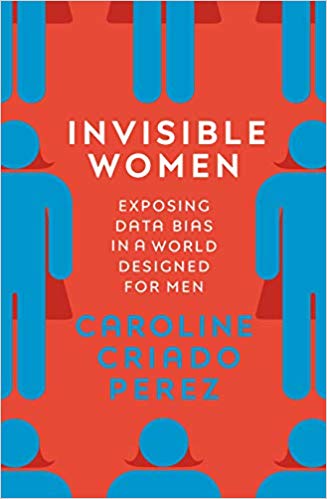Gender is perhaps the only topic, besides religion and politics, guaranteed to get people all riled up. And this book on gender data bias could get you quite riled up!
"Invisible Women: Exposing Data Bias in a World Designed for Men" is out now in paperback, just in time for International Women's Day. It's by British broadcaster and feminist campaigner, Caroline Criado Perez, and has won the Financial Times and McKinsey & Company Business Book of the Year Award, and the Royal Society Science Book Prize.
The author's central thesis is that almost all data used on a global scale to inform medical, scientific and technological development, urban planning, and economic and social policy is biased against women.
The data collected, declares Perez, is based on a male model. Men are “the default human” and the model does not take women into account.
In fact, Perez reveals that data on the female population is often not collected at all. And the impact of living in a world “designed for men,” according to Perez’s extensive research, places women at a disadvantage.

This could be shivering in offices set to male body temperature. Or having a heart attack go undiagnosed because the common symptoms for women are deemed “atypical.”
Perez addresses a vast landscape, including medication, restrooms, public transportation, automobile safety, and military equipment, to name a few areas.
Many facts in this book surprised me. Here’s a small sample:
Perez’s meticulous attention to detail is laudable. There are 1,331 citations, covering 69 pages! I have not met the author, but I can safely say she is a person who does not believe in half-measures.
I experienced a range of emotions while reading this book. It started with curiosity and fascination at seeing an author deftly pulling back the curtain to reveal the harm that gender bias can cause in so many vital areas. I couldn’t put the book down.
I was awed by the author's rigor and painstaking research. But a word of caution: while I recommend that everyone reads this stellar book, don’t read it straight through. You could end up demoralized.
The bad news is overwhelming at times. Even when there is something positive about the gender data gap narrowing, it is immediately followed with a “but” that introduces more bad news. There’s no let-up.
Yes, I enjoyed Perez’s investigative style and her level of detail and passion. But the barrage of research on what seemed like an inexhaustible range of topics eventually became a little tedious. There is too much repetition.
Most importantly, we are left feeling that we live in a world that’s intentionally hostile toward women.
Yet as the author says, “One of the most important things to say about the gender data gap is that it is not generally [my emphasis] malicious, or even deliberate. Quite the opposite. It is simply the product of a way of thinking that has been around for millennia and is therefore a kind of not thinking.”
This significant statement is buried in the preface. It's significant because, throughout the book, there is a relentless hammering of men, bordering on misandry.
In my experience, the vast majority of men care for their mothers, sisters, wives, and daughters. I am wondering how these good men might feel all being painted with the same sexist brush.
It would have been nice if the book offered a ray of hope. Certainly, one can say that there’s never been a better time to be a woman, in most of the developed world at least.
I am not an expert on gender, but just a quick search on the internet yielded much positive news for women. Here are a few examples:
Addressing data bias is a topic that's long overdue. And Perez is a formidable force for raising awareness. But to enact change, we need to get this book into the hands of as many men as possible, for the simple reason that men still hold the most power and are the majority of decision-makers in almost all areas of life.
It’s easy for "Invisible Women" to grab the attention of female readers. It’s preaching to the converted. So, a part of me wanted this book to be written from a gender-neutral stance, rather than from a feminist perspective.
Tempering zeal and passion with a more neutral approach may have resulted in a more balanced book, and one that might attract a broader readership. Ironically, this is one instance where it would be unwise to ignore the male data!
If you liked this review, you might also like analyst James Wilson's blog for Emerald Works about the wise (and unwise) use of data in an age of fake news.
Mind Tools Club members and corporate users will be able to access our Book Insight podcast on "Big Data" by Timandra Harkness.

"It started with an ice-breaker. I found myself face-to-face with the head of the whole company. And as I started answering the question, I began to cry, right in front of him. " Melanie Bell
Book Insight, Communication, Mental Health, Stress, Wellbeing
"Stolen Focus" is a wake-up call. It deserves our attention – if we can spare it!
Book Insight, Empowerment, Personal Development, Stress, Wellbeing
One of the few spaces that can have real impact in improving LGBTQ+ equality is the workplace. But it takes effort; and it's not only up to our LGBTQ+ colleagues. It's up to the rest of us, too.